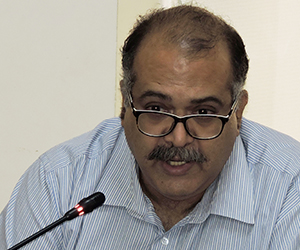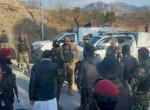From the day of its creation, Pakistan has always looked for an external patron, one which will pay its bills (or at least a part of them), indulge it with easy money for national projects, provide it with military hardware (or if you will, ‘toys for the boys’ so that they could indulge in their adventurism, mostly against India), lend it diplomatic and political support (once again mostly against India), and bolster its security against imagined and self-created enemies. The country which did all this and more for a larger part of the last sixty five years was the USA. During this period, China also started playing a crucial role in Pakistan's strategic calculus. But unlike the US, which ideologically never subscribed to giving a free lunch but always ended giving one to Pakistan, the Chinese who always spoke about giving free lunches (remember they are at least nominally communists), never gave a single free lunch to Pakistan. Not surprisingly, China has never really been able to stand in as a replacement for the US and the Pakistanis understood this even if they never publicly acknowledged this.
In recent years, however, relations between Pakistan and the US have seen a sharp downturn and nearly reached breakpoint on a couple of occasions. Although both countries have, for the moment at least, papered over their very deep differences, there is no trust, and certainly no love, left in the relationship which is all but broken. Notwithstanding expressions and assurances of fidelity by both sides, they are both preparing for life after separation. As a superpower, the US could easily turn its back on Pakistan except for the fact that Pakistan is not only a fountainhead of Islamist terror but also a nuclear weapon country and a nuclearised Jihad is probably the US’ worst nightmare. Add to this the US desire for maintaining a presence in the form of military bases in Afghanistan, for which it will need to remain engaged in some form or another with Pakistan. As far as Pakistan is concerned, it needs to scour for possible sources for replacing all the goodies and benefits it enjoyed from a patron state like the US. Thus it is that in the last couple of years Pakistan has been trying to readjust and reorient its foreign policy so that it can stay afloat after it loses the anchor of the US and its allies, both Islamic (read Saudi Arabia) and infidel (read Western bloc). Domestically too, it pays the government and military establishment in Pakistan well to make an attempt to break out of the US stranglehold and open new diplomatic options.
It is precisely in pursuit of this objective that Pakistan has been sweet-talking India (but without any change in its inimical policy towards India or any let or hindrance in exporting terror, illegal arms and narcotics into India), trying to re-energise its relations with Iran, and desperately wooing Russia. In the Pakistani calculus, if it can enlist the support of both Russia and China – the only two countries that Pakistanis believe can together serve as a possible, even likely, countervailing force to the US – it will be able to tackle the fallout of a divorce with the Americans. The example of Syria, which is being propped up by Russia and China in the face of an onslaught by opposition forces backed by the West and the Saudi-led Arab bloc, has only buttressed this viewpoint. Russia, along with China, is not only seen as a alternative source of supply for military hardware but also as a counterweight to the US in international fora like the UN Security Council.
Over the last couple of years, a number of visits have been exchanged between Pakistan and Russia. President Asif Zardari went to Moscow last year and met his then Russian counterpart Dmitri Medvedev. Later, Pakistan foreign minister Khar visited Moscow. The Russians also held meetings with Pakistani leaders on the sidelines of SCO summits and became part of a Quadrilateral arrangement which included Tajikistan and Afghanistan to discuss regional security issues and economic cooperation. Russian delegations have been visiting Pakistan and making a pitch for some high profile infrastructure projects like the Iran-Pakistan gas pipeline, restructuring the Pakistan Steel Mills, building electricity transmission lines for export of electricity from Central Asian states like Kyrgyzstan and Tajikistan to Pakistan through Afghanistan under the CASA 1000 project. There is also a big security dimension to the quest for improved ties. The Russians would like to engage with Pakistan to contain the fallout in its own Muslim dominated regions as well as its soft underbelly in Central Asia from a destabilised, or worse, Taliban controlled Afghanistan. The Pakistanis on the other hand are looking for Russian investments, Russian political and diplomatic support in the event of a breakdown in relations with the US, Russian military supplies and of course a higher volume of trade with Russia.
But, as the old saying goes: if wishes were horses, beggars would be ride. While Pakistan’s motives in wooing the Russians are quite clear, the big question is what does Pakistan bring on the table that will make the Russians want to thumb their nose at the US? This is the point on which the entire Pakistani strategy, and indeed Russian coquetry with the Pakistanis appears very iffy. For now it seems that the Russians are only exploring the possibilities of deepening their relations with Pakistan and the benefits this will bring and costs it will entail. It would therefore be highly pre-mature to talk of a budding strategic relationship between Russia and Pakistan at this stage. One obvious problem in building this relationship is that Pakistanis have convinced themselves that the Russians will be more than willing to embrace Pakistan in order to even the scores with the US in Afghanistan. Perverse though it may be, the Pakistani logic is that just as they used the US to unravel the Soviet Union, now they can probably use Russia to bloody, if not break, the US. Of course, the Pakistani mind is unable to factor in the possibility that if indeed the Russians want to even the scores with the Americans, then how come they don’t want to do the same with the Pakistanis who never stop boasting about their role in the breakup of the erstwhile Soviet Union. And if the Russians are hankering for revenge, then is it possible that they could be willing to tie up with Pakistan because this way they will kill two birds with one stone. In other words, the Russians could be getting even with both the principal (US) and the proxy (Pakistan) by playing them against each other and settling the scores for the loss and humiliation suffered by Russia in Afghanistan. After all, if it only wanted revenge against the US then all Russia would need to do is block the Northern Distribution Network and this will fix the Americans while giving the Pakistanis a leg up to squeeze the US for keeping open its logistics lines.
Revenge as a motive might appeal to an immature country like Pakistan. But it would be puerile for a Great Power like Russia to base high policy on a matter of far reaching significance on something as silly as revenge. It is important to evaluate the strategic and economic benefits that a relationship with Pakistan offers Russia. For now at least, it seems that the Russians are taking a page out of the Chinese book on dealing with the Pakistanis. Just as the Chinese use Pakistan as a ready market for dumping its obsolete technology and armaments and as a virtual captive market for building infrastructure projects at highly inflated costs, the Russians too want that they be given contracts for projects (for instance on the IP pipeline and Pakistan Steel Mills expansion) without any competitive bidding. So far the Pakistanis haven’t said yes but they also haven’t said no. But this dilly-dallying is touted as a major reason for Russian president Putin cancelling his much anticipated visit to Pakistan late last month. That despite all the tall talk of a fruitful relationship, fuelled in part by the visit of the Russian foreign minister to Islamabad and the Pakistan army chief to Moscow, things are not quite hunky dory is clear from the fact that there was no meeting between Putin and Kayani in Moscow, nor one between the Russian foreign minister and Asif Zardari in Islamabad. Normally, if things were good and there was a deal in the offing then Zardari isn’t the sort of man who would stand on protocol or prestige to avoid a meeting with a visiting dignitary to show his displeasure. That he decided to do so with Sergei Lavrov suggests that there was more optics and little substance in the relationship for now.
In purely strategic terms, Pakistan's utility for Russia and China in terms of controlling the spread of Islamist terrorism is very doubtful. Even though Pakistan would like to present itself as a critical player and a stabilising force in the region, the facts on the ground suggest something completely contrary: Pakistan has practically no ability to contribute meaningfully to bringing in peace, prosperity and stability in the region; its real value is its nuisance value in terms of its ability to destabilise the region, something it has demonstrated over the last few decades. In other words, Pakistan can fuel the fire of Islamic terror; it cannot douse this fire. Forget about stabilising Afghanistan, there is a big question mark over whether Pakistan can even get a handle on the Islamist terror groups which are operating inside Pakistan. While the Pakistani military establishment retains a large measure of control over jihadist terror groups that operate against India, it has steadily been losing its hold over the Taliban proxies like Tehrik-e-Taliban Pakistan (TTP) and its affiliates. Therefore, if the Russians are looking towards Pakistan keeping in view the experience of the 1990’s when the Pakistanis spawned the Taliban to establish control over Afghanistan, then they need to understand that the past was a different country, both in Afghanistan as well as in Pakistan. Back in the 1990s the Taliban were neither fighting Pakistan, nor were they aiming to Talibanise Pakistan. Today, both these conditions do not obtain and there are serious questions being raised over whether or not the Taliban will be amenable to following Pakistan's lead or even breaking ties with international jihadist groups like Al Qaeda, East Turkestan Islamic Movement, Islamic Movement of Uzbekistan or the militants from Chechnya, Dagestan and other parts of Russia.
Both the Russians and Chinese are also confronted with another big dilemma. While they are not comfortable with the presence of US troops in the region, they are also aware of the instability that will result once the Americans leave the region. Post 2014, the menu of options before Russia and China is basically a Hobson’s choice: they can do most of the heavy lifting themselves and at the same time depend partly on a mercenary state like Pakistan to handle the political and military affairs in Afghanistan in return for some military and economy aid; alternatively, they can just wait and watch and try to insulate themselves to the extent possible from the adverse fallout of Afghanistan’s descent into chaos. In either of these cases, Pakistan will almost certainly get sucked into the Afghan vortex, something that will only destabilise Pakistan further and spell ruin for its already bankrupt economy.
There is of course the possibility that China and Russia might lend some economic and military support to Pakistan. But chances are that this support will be woefully short of anything that Pakistan might require to continue staying afloat. On the flip side, a close military relationship with Pakistan will rob Russia of a lucrative market like India, especially in the field of defence supplies. No amount of military and economic cooperation with a basket case like Pakistan will be able to compensate Russia for the loss of a market like India’s. After all, how many countries will be willing to spend close to $ 3 billion for a worthless tub like the aircraft carrier Admiral Gorshkov and sill uphold it as an example of close defence relationship with Russia? Unlike India which pays Russia in hard currency for defence equipment, Pakistan will only want it either gratis or on long deferred terms of payment (which in the Pakistani context generally translates into ‘forget about the money’).
Put it all in perspective, and it becomes quite clear that the much of the talk in Pakistan of building an alliance with Russia is for the moment at least only that.
Published Date : 10th October 2012










Post new comment